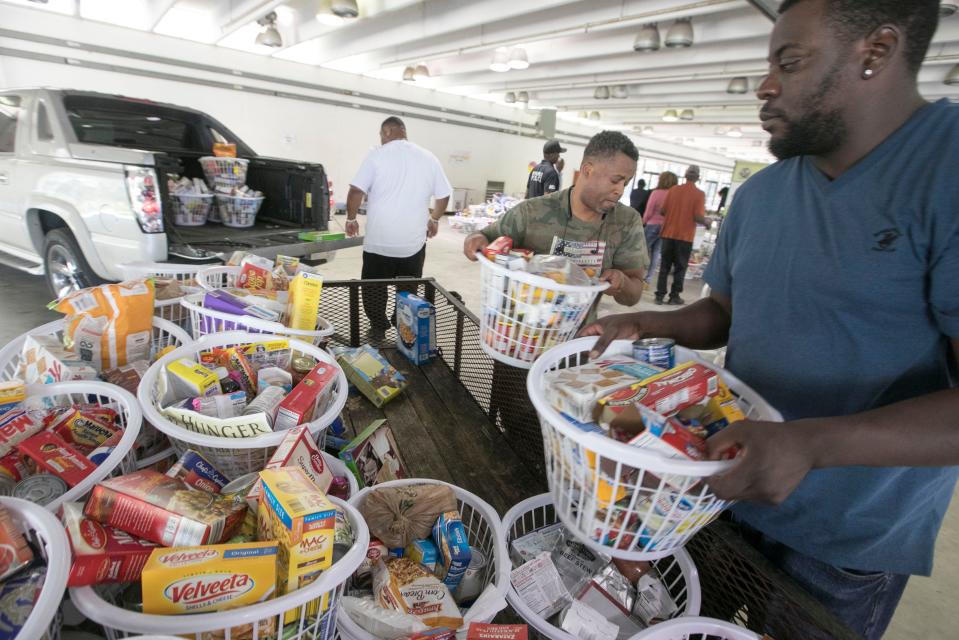Businesses will be forced to donate unused food to pantries or compost under new policy
Restaurants and grocery stores will be required to donate food they don’t use to food pantries or turn it into compost instead of throwing it in the dumpster under one of several of Gainesville's new sweeping zero waste ordinances.
Those requirements are among one of three proposed laws approved by the Gainesville City Commission on Thursday.
The ordinances require one more reading before taking effect and are designed to significantly reduce waste going to the landfill.
Another proposal would require that food that has not yet expired be given to people or animals first before being composted, which City Commissioner Adrian Hayes-Santos said is a "big" deal.
"They will have to get (the food) to people who are hungry, so it is a major step in that direction of not wasting edible food and making sure that people in our community don’t go hungry," Hayes-Santos said.
Diversion from landfills: Gainesville's composting program diverts food waste from landfill, should be expanded
Zero Waste discussions: Zero Waste Subcommittee to discuss proposed ordinance on Tuesday at City Hall
Composting diverts from landfill waste: Gainesville's composting program diverts food waste from landfill, should be expanded
The commission adopted the recommendations from the “Zero Waste Subcommittee,” which includes residents and city employees who have met regularly since September 2020.
“We are going to have one of the most significant food waste diversion programs in the country, which will require grocery stores and restaurants to donate edible food to food pantries,” said Mike Heimbach, sustainability manager for the city on Friday.
“There are some significant changes to how we are going to handle our waste going forward in the city, and it’s across pretty much all aspects of solid waste," he said.
Heimbach said decomposing food waste in the landfill generates about 80 times more greenhouse gases than if it was processed in a different way.
The zero-waste policy was modeled after other city ordinances, such as San Francisco and Denver, though Heimbach says Gainesville has arguably the most comprehensive food waste plan in the southeastern part of the country.
The new plan requires businesses that typically dispose of more than one cubic yard of food — or about two full-size garbage bags — per week to now separate the food from the regular trash stream.
Food could then be donated to a pantry, if not outdated, or picked up by a company to use for compost. Business owners, however, would be on their own to foot the bill for compost pickup.
“There is an ability (for a business owner) to save money by doing this and not paying for food to go to the landfill,” Heimbach said.
Violators of the ordinance could receive a citation of $125 for an offense, but the city hopes for voluntary compliance, Heimbach said.

Maureen Quinlan, the spokeswoman for the Bread of Mighty Food Bank, said the new law should generate more food for homeless people and families at a time when it is most needed.
The food bank partners with 170 food pantries, soup kitchens and homeless shelters to distribute food to the needy.
Quinlan said the timing couldn't be better, as low-income families are preparing for summer break and their children won't have school-provided meals throughout the week.
“I think that it does sound like it’s going to be a great opportunity to help address the hunger insecure in our community," Quinlan said. "Of course, we have ways (through) the network of food pantries to get that food into the hands of individuals or families who will use it. If a restaurant or grocery store can’t use it, we certainly can re-home that food.”
The commission also directed apartment complexes to have a “lease-transition plan,” which would require management to make sure items left behind by tenants also don't end up in the landfill.
“We’re talking about furniture, clothing, home goods," Quinlan said. "There needs to be a plan in place so that either the resident who stays there can take those materials or find a way to donate those to organizations that deal in used goods.”
If approved, the new policy requires apartment complexes of 200 units or larger to comply effective January 2023. In two years' time, complexes of 50 units or more will need to comply.
City staff will check apartments and make sure they are living up to their transition plan, Heimbach said.
“There is a lot of available stuff that gets thrown out each year (from apartments). It’s a huge volume,” he added.
The ordinances also addresses other ways to reduce the items going to the landfill, some of which include requiring drugstores to provide take-back prescriptions, commercial establishments to have additional recycling containers and for property owners to provide commercial tenants with enough space for solid waste and recycling.
This article originally appeared on The Gainesville Sun: Businesses to donate unused food under Gainesville's 'zero waste' rule

